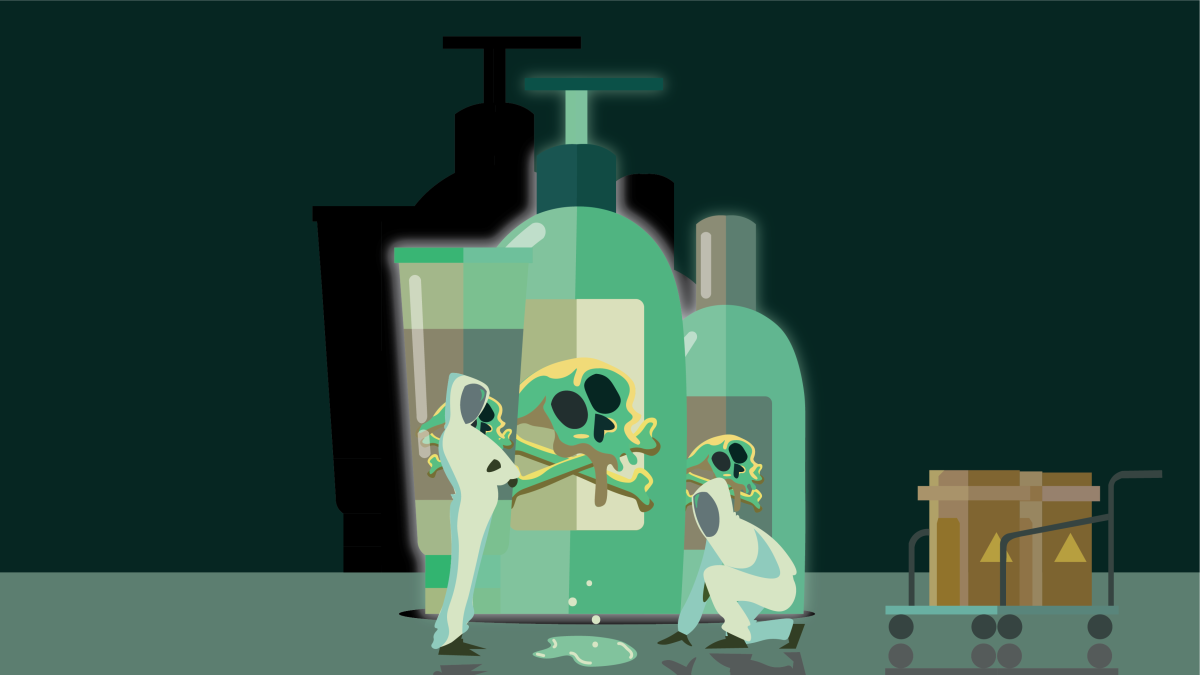Hair is important. It empowers people to feel worthy—to feel beautiful. For some, it holds cultural significance. But regardless of its significance to any certain individual, one thing remains true; it’s the first thing people notice about you.
Companies know this, and they have created an industry centered around the way your hair looks. Corporations create products that promise to smooth split-ends and enhance shine. They provide pills and potions that “guarantee” positive results, all while turning a profit.
But what allows them to sell these “miracle” products for relatively cheap?
Harmful chemicals. Some of these chemicals, however, are toxic and condemn scalps everywhere to endure as cracked, itching wastelands to line corporate pockets.
Sulfate is the signature chemical that allows shampoo to form its rich lather. However, sulfates may be carcinogenic if, and only if, they come into contact with 1,4-dioxane (a solvent used in cosmetics), according to Healthline.
This is not to mention the moisture-killing nature of sulfates that may lead to scalp irritation.
There are also several forms of sulfates all possessing slightly different names that just make it harder for consumers to differentiate what is safe and what isn’t.
Another common ingredient contained within your average hair care bundle is formaldehyde. Yes, the formaldehyde that preserves dead animals in jars.
When used in extremely small batches, formaldehyde is safe for the human body and can prevent the growth of microorganisms in conditioners and style products.
However, skin can become irritated and dry out when exposed to formaldehyde for long periods of time.
And, fun fact, corporations don’t have to list formaldehyde as an ingredient when it’s bonded with something or used in small enough doses, according to the Occupational Safety and Health Administration.
The most infamous ingredient in most conditioners and styling products is silicone. When put in products, silicone wraps hair follicles in a beautiful silky smooth cocoon.
The issue is once the silicone is on the strand, it tends to keep moisture out. Think water hitting an oily surface—it beads right off. Silicone tends to end up drying hair out in the long run, according to Healthline.
And, like everything else, brands will avoid saying “silicone” on the ingredients list, so be on the lookout for dimethicone, cyclomethicone, phenyl trimethicone, cyclopentasiloxane and cyclohexasiloxane.
Those are just a few of the common ingredients that may be contained in any of the hair products we hold near and dear. But, why do companies put these potentially dangerous substances in their products? Because they suck.
Corporations don’t care about the consumer. All they want to do is keep you buying, so if that means damaging your scalp so you buy their new “ultra thickening snail mucin aloe vera soothing scalp spray” for $43.99, well that’s just more money for the suits.
The worst part is most of these ingredients have alternatives that are much better for people. For example, silicones and cold-pressed plant-derived oils accomplish the same thing.
But one is much cheaper and less labor-intensive to put in a product. Obviously, the corporate overlords choose to go with the cheaper chemical that causes more damage and will keep consumers crawling back hoping for a different result.
Unfortunately, the world is slow moving when it wants to be. Companies are unlikely to change unless people make a big enough of a fuss, so by all means, please cause a ruckus.
Here’s what you can do to try and stay on the up and up. Try and switch to more natural products, be on the lookout for items lacking some of the aforementioned chemicals when buying mainstream products and always remember one thing, the corporations will never care about you so long as they turn a profit. You have to care for yourself.
Garrett McEntee is an 18-year-old English freshman from Benton.





